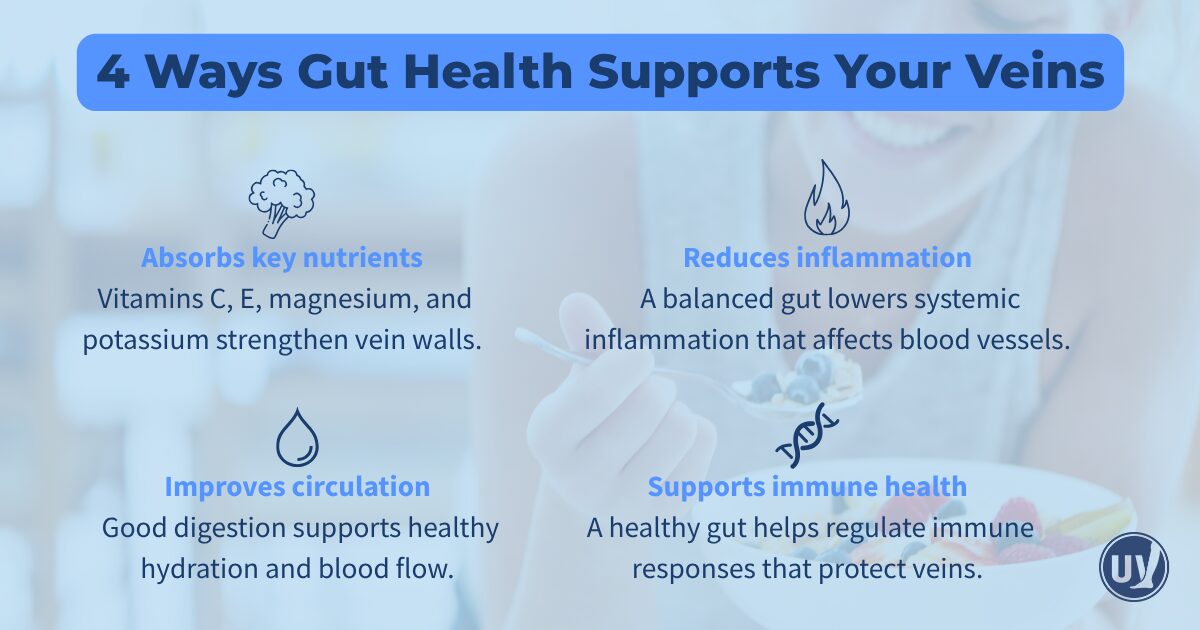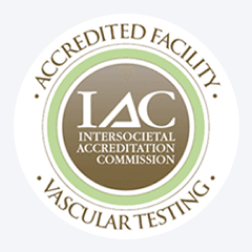When most people think about vascular health, they immediately think of arteries, veins, and the heart. Similarly, discussions around gut health typically center on digestion, food sensitivities, or probiotics. But here’s an important truth: the health of your gut and veins are more connected than you might expect.
This blog explores how your digestive system plays a critical role in vascular health, including how inflammation, nutrient absorption, and even your gut bacteria can impact the condition of your veins.
A Quick Overview of the Vascular System
Your vascular system is made up of the heart, arteries, veins, and capillaries. This intricate network is responsible for transporting blood, oxygen, and nutrients throughout your body while also carrying away waste products. Veins, in particular, return deoxygenated blood back to the heart so it can be reoxygenated and pumped through the body again.
Unlike arteries, which have thick muscular walls, veins have thinner walls and rely on a series of one-way valves to keep blood flowing in the correct direction. This is especially important in the legs, where veins must work against gravity to carry blood back to the heart. When these valves weaken or become damaged, blood can pool in the veins, resulting in varicose veins, swelling, pain, and other symptoms of chronic venous insufficiency (CVI).
But vein function doesn’t happen in isolation. What’s happening in your digestive system may also play a role in how well your veins perform.
The Gut-Vein Connection
So what links your gut to your veins? The answer lies in three key areas: inflammation, nutrient absorption, and the gut microbiome.
Inflammation and Vascular Health
Chronic inflammation is one of the most significant threats to vascular health. It can damage the lining of blood vessels and contribute to problems like atherosclerosis (narrowing of the arteries), varicose veins, and poor circulation.
The gut is a major site of immune activity and inflammation regulation. When your gut microbiome—the trillions of bacteria living in your digestive tract—is balanced, it helps regulate inflammation throughout the body. However, when that balance is disrupted (a condition known as gut dysbiosis), inflammation can increase systemically, including in your veins.
This inflammatory cascade can lead to endothelial dysfunction, a condition in which the lining of blood vessels stops working properly. It may also impair your veins’ ability to dilate and contract as needed, which is critical for efficient blood flow.
Nutrient Absorption and Vein Strength
Your digestive system is responsible for absorbing essential nutrients that directly support vein health.
For example:
- Vitamin C helps build collagen and elastin, which are structural proteins that keep blood vessels strong and flexible.
- Vitamin E acts as an antioxidant that protects the walls of blood vessels from damage.
- Magnesium and potassium support healthy muscle function, including the smooth muscles in vein walls.
If your gut isn’t absorbing these nutrients properly, due to poor diet, inflammation, or an underlying condition, your veins may not be getting the building blocks they need to stay strong and resilient.
The Role of the Microbiome
A healthy gut microbiome helps regulate everything from metabolism to immunity. Studies have shown that gut bacteria play a role in blood pressure regulation, blood sugar levels, and even cholesterol balance—all of which can affect vascular health.
An imbalanced microbiome can contribute to leaky gut syndrome, a condition where the intestinal barrier becomes too permeable, allowing harmful substances to enter the bloodstream and trigger systemic inflammation. This inflammation doesn’t just affect your gut; it can also stress your veins and compromise circulation.
How to Support Both Gut and Vein Health
Improving your gut health can help reduce inflammation, optimize nutrient absorption, and support your vascular system. Here are a few science-backed ways to care for both systems at once.

Eat a Gut- and Heart-Healthy Diet
- Fiber-rich foods like leafy greens, oats, lentils, and berries nourish beneficial gut bacteria and support regular digestion.
- Antioxidant-rich produce such as oranges, spinach, and sweet potatoes help protect blood vessels.
- Omega-3 fatty acids, found in fish and flaxseeds, support circulation and reduce inflammation.
- Fermented foods like yogurt, sauerkraut, and kimchi replenish your gut microbiome with healthy bacteria.
A well-rounded, nutrient-dense diet gives your body the resources it needs to repair and strengthen blood vessels and maintain gut integrity.
Stay Hydrated
Water helps move nutrients through the digestive tract and keeps blood fluid, which prevents clotting and improves circulation. Staying hydrated is especially important if you are at risk for vein issues or already experiencing symptoms like swelling or heaviness in your legs.
Move Your Body Regularly
Exercise improves blood flow, supports digestion, and reduces inflammation. Aim for 30 minutes of moderate movement most days, including:
- Walking
- Swimming
- Yoga or stretching
- Resistance training
Movement helps activate the muscle pump in your legs, encouraging blood flow back to the heart and reducing the risk of vein disease.
Manage Stress
Chronic stress disrupts the gut-brain axis, alters the gut microbiome, and increases systemic inflammation. Mindful practices like deep breathing, meditation, or light stretching can help regulate stress levels and protect both your digestive and vascular systems.
When to Seek Medical Advice
If you’re experiencing any of the following symptoms, it’s important to speak with a healthcare provider who specializes in vascular health:
Signs of Vein Issues:
- Swelling in the legs or ankles
- Visible varicose or spider veins
- Aching, heaviness, or pain in the legs
- Skin discoloration or open sores on the lower legs
Signs of Gut Imbalance:
- Bloating, constipation, or diarrhea
- Unexplained fatigue or inflammation
- Nutrient deficiencies
- Persistent digestive discomfort
Even mild symptoms can point to a deeper issue. The sooner you get evaluated, the more options you’ll have to prevent complications and improve your quality of life.
The Bottom Line
The connection between gut health and vein health is a fascinating and important one. From nutrient absorption to inflammation regulation, the state of your digestive system can directly impact the strength and function of your vascular system.
By nourishing your gut, staying active, and seeking care for early signs of vascular issues, you can support both systems and take a proactive role in your long-term health.
If you have questions about your vein health, symptoms, or treatment options, reach out to United Vein & Vascular Centers today. We’re here to help you feel better, move better, and live healthier from the inside out.
Find a Vein & Vascular Specialist Near You
With 45+ locations nationwide, expert vein and vascular care is closer than you think. Find your nearest United Vein & Vascular Center and start your journey toward improved circulation and mobility.
Frequently Asked Questions
Yes. Chronic inflammation in the gut can increase systemic inflammation throughout the body, including the vascular system. This can weaken vein walls, impair blood flow, and contribute to conditions like varicose veins or chronic venous insufficiency.
Vitamins C and E, omega-3 fatty acids, magnesium, and potassium are all essential for supporting healthy veins. A fiber-rich diet also helps nourish your gut microbiome, reducing inflammation and improving nutrient absorption.
While not all vein symptoms are gut-related, signs of poor gut health like chronic bloating, irregular bowel movements, or nutrient deficiencies may go hand-in-hand with vascular symptoms like swelling, leg heaviness, or visible varicose veins. A vascular specialist can help assess whether both systems are contributing to your symptoms.


